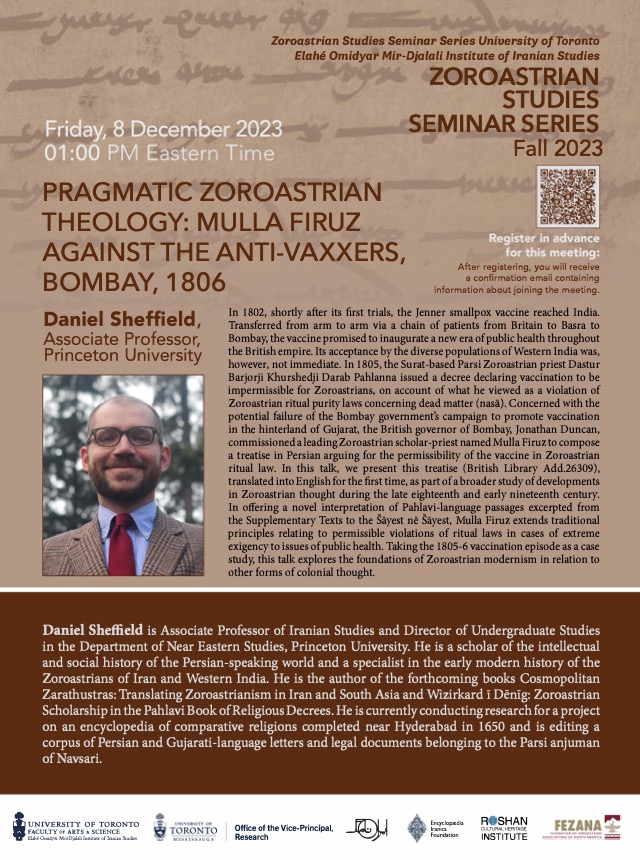

The Elahé Omidyar Mir-Djalali Institute of Iranian StudiesUniversity of Toronto Zoroastrian Studies SeminarpresentsPragmatic Zoroastrian Theology: Mulla Firuz against the Anti-Vaxxers, Bombay, 1806
Daniel Sheffield, Associate Professor, Princeton University
Friday, 8 December 2023, 1:00 p.m. Eastern Time (Canada and US) Zoom Meeting Registration:https://utoronto.zoom.us/meeting/register/tZYod-CsqzkuG9K6V4Y8PHjQkGgkvhNsGb3c
After registering, you will receive a confirmation email containing information about joining the meeting.
Abstract:
In 1802, shortly after its first trials, the Jenner smallpox vaccine reached India. Transferred from arm to arm via a chain of patients from Britain to Basra to Bombay, the vaccine promised to inaugurate a new era of public health throughout the British empire. Its acceptance by the diverse populations of Western India was, however, not immediate. In 1805, the Surat-based Parsi Zoroastrian priest Dastur Barjorji Khurshedji Darab Pahlanna issued a decree declaring vaccination to be impermissible for Zoroastrians, on account of what he viewed as a violation of Zoroastrian ritual purity laws concerning dead matter (nasā). Concerned with the potential failure of the Bombay government’s campaign to promote vaccination in the hinterland of Gujarat, the British governor of Bombay, Jonathan Duncan, commissioned a leading Zoroastrian scholar-priest named Mulla Firuz to compose a treatise in Persian arguing for the permissibility of the vaccine in Zoroastrian ritual law. In this talk, we present this treatise (British Library Add.26309), translated into English for the first time, as part of a broader study of developments in Zoroastrian thought during the late eighteenth and early nineteenth century. In offering a novel interpretation of Pahlavi-language passages excerpted from the Supplementary Texts to the Šāyest nē Šāyest, Mulla Firuz extends traditional principles relating to permissible violations of ritual laws in cases of extreme exigency to issues of public health. Taking the 1805-6 vaccination episode as a case study, this talk explores the foundations of Zoroastrian modernism in relation to other forms of colonial thought.
Bio:
Daniel Sheffield is Associate Professor of Iranian Studies and Director of Undergraduate Studies in the Department of Near Eastern Studies, Princeton University. He is a scholar of the intellectual and social history of the Persian-speaking world and a specialist in the early modern history of the Zoroastrians of Iran and Western India. He is the author of the forthcoming books Cosmopolitan Zarathustras: Translating Zoroastrianism in Iran and South Asia and Wizirkard ī Dēnīg: Zoroastrian Scholarship in the Pahlavi Book of Religious Decrees. He is currently conducting research for a project on an encyclopedia of comparative religions completed near Hyderabad in 1650 and is editing a corpus of Persian and Gujarati-language letters and legal documents belonging to the Parsi anjuman of Navsari.